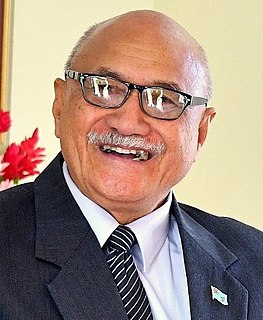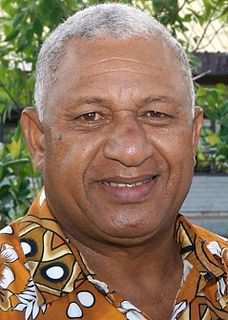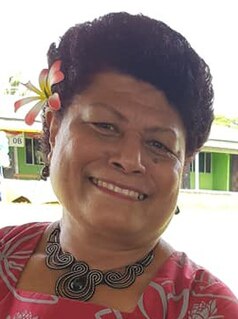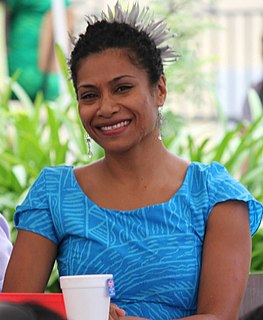| |||||||||||||||||||||||||||||||||||||
All 51 seats in the Parliament of Fiji 26 seats needed for a majority | |||||||||||||||||||||||||||||||||||||
|---|---|---|---|---|---|---|---|---|---|---|---|---|---|---|---|---|---|---|---|---|---|---|---|---|---|---|---|---|---|---|---|---|---|---|---|---|---|
| Registered | 637,537 | ||||||||||||||||||||||||||||||||||||
| Turnout | 458,570 (72%) | ||||||||||||||||||||||||||||||||||||
| |||||||||||||||||||||||||||||||||||||
| |||||||||||||||||||||||||||||||||||||
 |
|---|
| This article is part of a series on the politics and government of Fiji |
Legislative
|
Judiciary |
|
General elections were held in Fiji on 14 November 2018. [1] The result was a victory for the ruling FijiFirst party of Prime Minister Frank Bainimarama, which received just over 50% of the vote and 27 of the 51 seats in Parliament, a loss of five seats. [2] The main opposition party, Social Democratic Liberal Party, gained six seats, whilst the National Federation Party retained its three seats.

Fiji, officially the Republic of Fiji, is an island country in Melanesia, part of Oceania in the South Pacific Ocean about 1,100 nautical miles northeast of New Zealand's North Island. Its closest neighbours are Vanuatu to the west, New Caledonia to the southwest, New Zealand's Kermadec Islands to the southeast, Tonga to the east, the Samoas and France's Wallis and Futuna to the northeast, and Tuvalu to the north. Fiji consists of an archipelago of more than 330 islands—of which 110 are permanently inhabited—and more than 500 islets, amounting to a total land area of about 18,300 square kilometres (7,100 sq mi). The most outlying island is Ono-i-Lau. The two major islands, Viti Levu and Vanua Levu, account for 87% of the total population of 898,760. The capital, Suva, on Viti Levu, serves as the country's principal cruise-ship port. About three-quarters of Fijians live on Viti Levu's coasts, either in Suva or in smaller urban centres such as Nadi—where tourism is the major local industry—or Lautoka, where the sugar-cane industry is paramount. Due to its terrain, the interior of Viti Levu is sparsely inhabited.

FijiFirst is a registered political party in Fiji. The party was formed in March 2014 by the current Prime Minister, Frank Bainimarama.

Josaia Voreqe Bainimarama CF, MSD, OStJ, known commonly as Frank Bainimarama and sometimes by the chiefly title Ratu, is a Fijian naval officer and politician who has been Prime Minister of Fiji since 2007. He was the Commander of the Fijian Military Forces from 1999 to 2014. While holding the office of Prime Minister, he has temporarily held various ministerial portfolios: Information, Home Affairs, Immigration, Public Service, Indigenous and Multi-Ethnic Affairs, Finance, and Foreign Affairs.
Contents
The elections also saw female representation in Parliament rise to 20 percent, with 10 women elected. [3]













